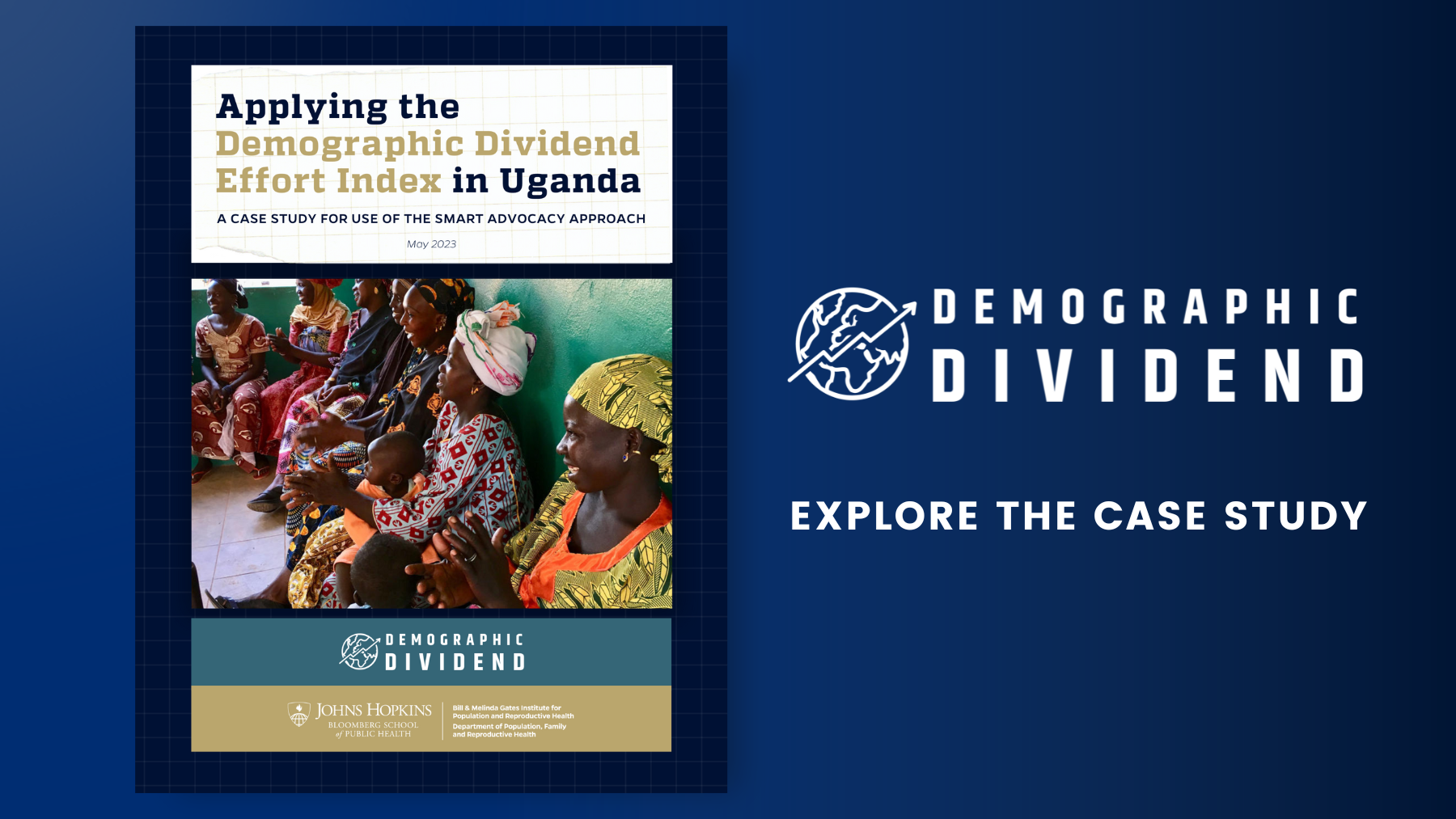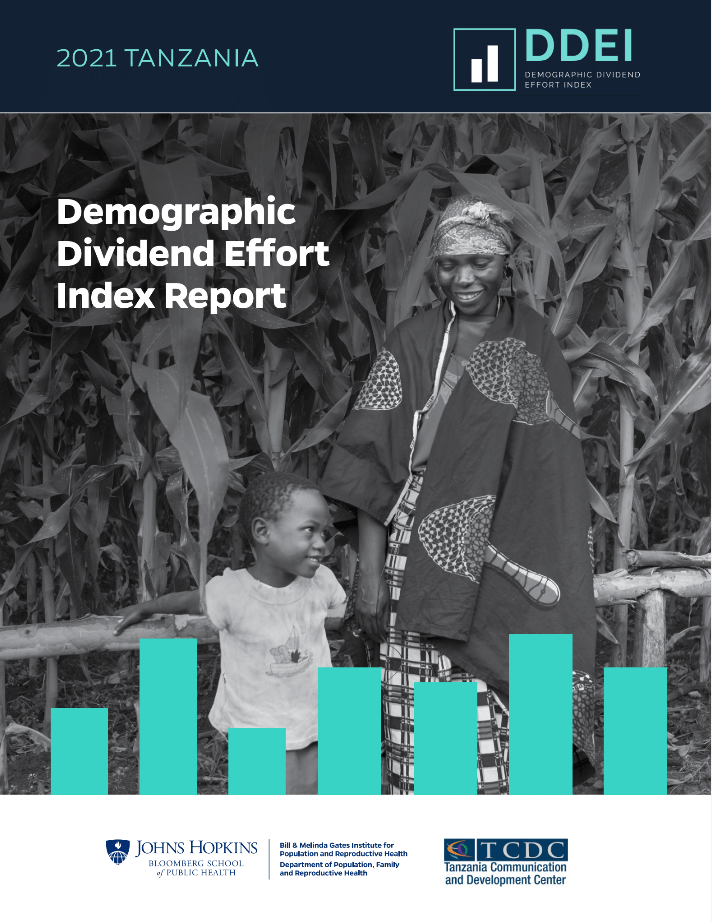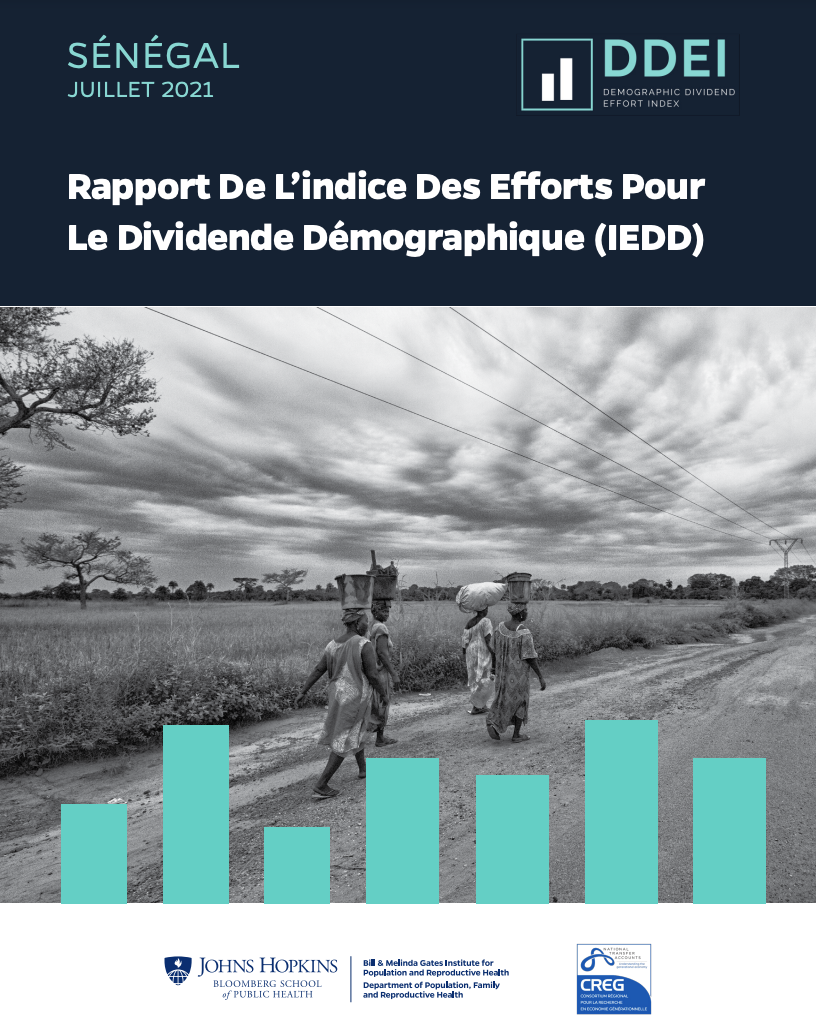About the Demographic Dividend Initiative
This website is hosted by the William H. Gates Sr. Institute for Population and Reproductive Health at the Johns Hopkins Bloomberg School of Public Health. It exists to host resource materials available from a number of organizations engaged in research, advocacy, and policy work related to the demographic dividend. Organizations can share their collective and individual contributions to the research literature and base of policy communication materials on the demographic dividend by emailing either a link or a PDF file.
The demographic dividend is the name given by Harvard economists David Bloom and David Canning to the boost in economic growth that can result from changes in a country’s population age structure. As fertility rates decrease, a country’s working-age population grows larger relative to the young dependent population. With more people in the labor force and fewer children to support, a country has a window of opportunity for rapid economic growth if the right social and economic investments and policies are made in health, education, governance, and the economy.
Conversely, research shows that resource requirements to support a large population of children and youth can depress the pace of economic growth and prevent needed investments in human capital.
The demographic dividend offers a framework by which to define a research agenda, advocate for policies, and mobilize resources that can help countries realize their potential for accelerated economic growth.
The Institute has been a leader in driving forward the demographic dividend (DD) framework globally, and particularly with our African partners.
Meet the Demographic Dividend Team:
Carolina Cardona, Ph.D., M.H.S.
Carolina Cardona, Ph.D., M.H.S., is a health economist focused on understanding demographic processes and their effect on economic development. She is particularly interested in the influence of women’s sexual and reproductive health behavior on women’s roles in society and how they shape demographic transitions and economic development. To date, her work has investigated these areas in the context of developing countries from sub-Saharan Africa. Much of her research relied on data collected by the Performance Monitoring for Action (PMA) project to study contraceptive dynamics using two types of longitudinal data: 1) clients of reproductive age seeking healthcare services, and 2) women of reproductive age surveyed at their household. She has also devoted much research to understanding how demographic transitions in sub-Saharan Africa can spark economic growth. She has co-developed a tool to track the efforts placed by governments in setting a favorable policy environment that could allow countries to harness a demographic dividend. She is also interested in understanding how government spending influences women’s sexual and reproductive health decisions and other population health outcomes.
She received her Ph.D. from the Department of Population, Family and Reproductive Health at Johns Hopkins University in 2021, with a concentration in health economics. She also holds a master’s degree in health economics from the same university during which she was a Fulbright scholar. She recently joined the Department of Population, Family and Reproductive Health as an Assistant Scientist and as a Research Health Economist at the Bill & Melinda Gates Institute for Population and Reproductive Health.
Ian Salas, Ph.D.
Ian Salas, Ph.D., is an applied microeconomist whose work in research, teaching, and practice lies at the intersection of economics with demography, development, gender, and public health.
He joined the faculty of the Johns Hopkins Bloomberg School of Public Health in 2015 as an Assistant Scientist at the Department of Population, Family and Reproductive Health and a Research Economist at the Bill & Melinda Gates Institute for Population and Reproductive Health. Prior to this, he was a David E. Bell Research Fellow at the Center for Population and Development Studies at Harvard University.
He is currently involved in several initiatives of the Gates Institute as a Senior Technical Advisor in projects related to scaling up high-impact family planning interventions in urban poor settings in Africa and Asia, devising tools for monitoring the performance of large-scale reproductive health programs, and studying various countries’ prospects for realizing the demographic dividend. He recently taught the course on Principles of Population Change at Hopkins, and was a previous co-chair of the Demographic Dividend subcommittee of the International Conference on Family Planning (ICFP).
He received his Ph.D. in Economics in 2013 from the University of California, Irvine with a specialization in development and labor economics. He has extensive expertise in estimating economic lifecycles using the National Transfer Accounts (NTA) framework, a building block in determining the strength of the demographic dividend that a developing country can reap. He has been conducting research on the economics and financing of family planning, including the causal identification of the fertility and health effects of having a weak supply chain system for contraceptives. This work has won for him the 2014 Dorothy S. Thomas Award for best dissertation paper from the Population Association of America (PAA) and the 2015 Take Stock Hero Award from the Reproductive Health Supplies Coalition (RHSC).
Saifuddin Ahmed, PhD, MBBS
Saifuddin Ahmed, Ph.D., M.B.B.S., is a Professor in the Department of Population and Family Reproductive Health, with a joint appointment in the Department of Biostatistics, in the Bloomberg School of Public Health, Johns Hopkins University. Dr. Ahmed has a medical background and training in demography and epidemiology with expertise in complex sampling strategies and population surveys. He has published more than 160 papers and authored several highly cited papers on family planning, maternal health, and women’s empowerment (citations 11,334; H-index-51). He has assisted the GI team in the development of the DD effort index and advised the African Development Bank on demographic dividends.
Qingfeng Li, Ph.D., M.H.S.
Qingfeng Li, Ph.D., M.H.S., is an assistant professor in the Department of International Health at Johns Hopkins Bloomberg School of Public Health. A demographer and statistician by training, he develops quantitative models to address a variety of public health issues, including maternal and child health, demographic dividend, and injuries. His methodological expertise covers big data analytics and systems science modeling.
At Hopkins, Dr. Li teaches courses on health systems research, monitoring and evaluation methods, and systems science modeling. He holds a PhD degree in Population and Health (JHU, 2013), a MHS degree in biostatistics (JHU, 2013), and a Master degree in Economics (Peking University, China, 2009).



